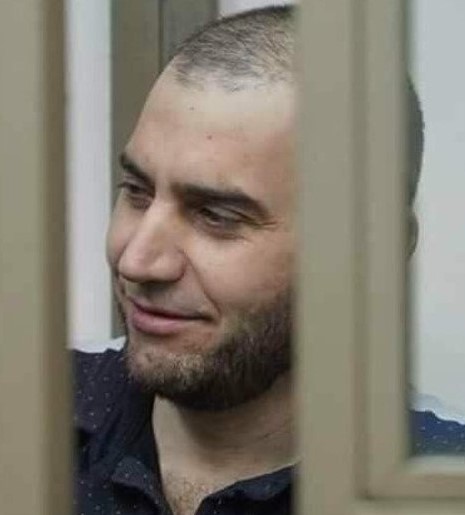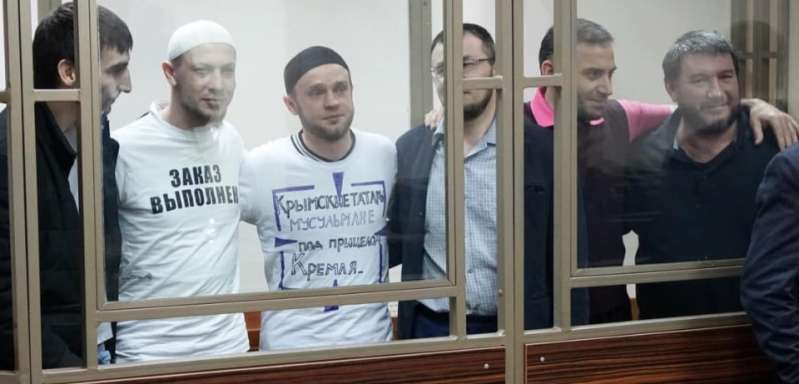• Topics / Human Rights Abuses in Russian-occupied Crimea
Crimean Tatar prisoner of conscience sentenced to 19 years for religious 'dissidence' faces new torment in Russian prison

Muslim Aliev is one of at least two Crimean Tatar political prisoners who are almost permanently held in the appalling conditions of a Russian punishment cell [SHIZO]. Aliev has been recognized by Amnesty International as a prisoner of conscience due to the lack of any grounds for the 19-year sentence passed by a Russian court, and it seems safe to assume that these extra ‘punishments’ are equally unwarranted.
Aliev’s wife, Nadzhiye Adzhi-Mamutova explained to Crimean Solidarity that she had received no calls from her husband since early in September. Although she finally rang the Russian prison colony herself, it seems that she only learned about the number of times Aliev was placed in SHIZO after a phone call to his wife from fellow political prisoner, Teymur Abdullayev, who has himself been held in SIZO for well over a year in total (details here).
Any such term in a SHIZO should be for no more than 15 days, yet both Aliev and Abdullayev have been held there for much longer. Aliev arrived at the prison colony in Bashkortostan on 9 September 2020 and was first sent to SHIZO less than a month later, and was then held there from 4 December 2020 until 23 April 2021. This was then used as the pretext for transferring him to SUS [‘Harsh conditions’ – another form of punishment cell and restrictions, cynically imposed against prisoners who have frequently faced unwarranted ‘punishments]. He was then held in a SHIZO for virtually all of September and, again, from 27 October. Aliev’s wife is appealing to Ukraine’s Ombudsperson and her Russian counterpart, to the Russian public monitoring commissions (which can gain access to political prisoners), journalists and human rights activists to help put an end to such treatment. She stresses that her husband is already imprisoned for his faith, not for any real crime and is now facing totally unwarranted pressure.
Aliev is one of four men from Yalta in occupied Crimea who were arrested on 11 February 2016 in an FSB ‘operation’ of unprecedented brutality. International protest was largely prompted by the fact that Russia had so clearly targeted a human rights activist, Emir-Usein Kuku, however Aliev’s arrest was also because of his civic and religious ‘dissidence’.
Aliev was the first of three Crimean Tatar political prisoners whose arrests are almost certainly linked with their active membership of the ‘Alushta’ Muslim Community. There has been a mounted offensive against this religious community which has demonstrated independence from the Muftiat of Crimea. The latter’s collaboration with the Russian occupation regime has given it benefits, including, it would seem, the effective appropriation of the Yukhary-Dzhami Mosque which has been illegally seized from the ‘Alushta’ community. Aliev had, from 2005, been an active member, and even the informal leader, of the community and had often, at their request, led Friday prayers and delivered sermons. He was often invited to organize burials and ritual prayers, as well as to administer weddings.
Aliev and his wife have two adult daughters and two sons who, at the time of his arrest, were fairly small. Nadzhiye has recounted how the armed men burst into their home at around 6.30 a.m. Four men with machine guns forced Aliev to the floor with his hands behind his back in front of 7-year-old Seidali and his brother, Ilyas (11). The search was carried out with the flagrant violations that have become standard Russian practice, with lawyers prevented from being present and the supposedly ‘independent witnesses’ brought by the FSB. Although Russia is using ‘terrorism’ charges against the men, the officers did not look for any weapons, etc., only books. One of the men asked another whether the Quran is a terrorist book. Having been told that they were ‘allowed’ that book, the man simply flung it onto the floor.
Seidali was especially traumatized and for months refused to sleep in the room where he had seen his father being so brutally treated. He later had to endure the same, when the FSB appeared again on 19 July 2018, this time searching the house because of a Facebook picture which his 21-year-old sister Gulsum had merely reposted.

Four men were arrested that day: Muslim Aliev (b. 1971); Inver Bekirov (b. 1963); Emir-Usein Kuku (b. 1976) and Vadim Siruk (b. 1989) We know from the testimony of a friend of Kuku’s that at least two of the other men taken away for ‘questioning’ were tortured and threatened with the same charges if they did not give false testimony. Two much younger men were arrested on 18 April: Refat Alimov (b. 1991) and Arsen Dzhepparov (b. 1991).
All six men were effectively accused only of unproven involvement in Hizb ut-Tahrir, a peaceful transnational Muslim movement which is legal in Ukraine and most countries. The ruling by Russia’s Supreme Court in 2003 to declare it ‘terrorist’ was kept secret until it was too late to lodge an appeal. There was no attempt to explain how an organization not known to have committed any acts of terror or violence anywhere in the world can be labelled ‘terrorist’.
In condemning this case, the Memorial Human Rights Centre wrote that “Hizb ut-Tahrir cases are among the so-called ‘serial’ cases: the FSB obtains ‘high results’ (dozens of convictions) for minimum effort, practising mass persecution without any grounds”. In declaring all the men political prisoners, Memorial stressed the lack of any grounds for labelling Hizb ut-Tahrir ‘terrorist’ and pointed out that Russia, as an occupying state, is also in breach of international law for imposing its legislation on occupied Crimea.
Initially, only Aliev was designated the role of ‘organizer’ of a supposed ‘Hizb ut-Tahrir cell’, under Article 205.5 § 1 of Russia’s criminal code, with this carrying a sentence of up to life imprisonment. Then later, after further shocking violations, Inver Bekirov was also claimed to be an ‘organizer’. The other men were charged with ‘involvement’ under Article 205.5 § 2. All six men were later charged additionally with ‘planning the violent seizure of power by an organized group according to a prior conspiracy’ (Article 278).
The only ‘evidence’ against Aliev and the five other men was a linguistic-religious ‘expert assessment’ of an illicitly recorded conversation “in the kitchen” where the men were discussing the situation in Russia, Ukraine, the fate of Crimea, the place of Islam in both countries and various religious postulates. Such assessments are provided by FSB-loyal academics with little or no knowledge of Islam, and it is worth noting that the assessment in this case was one of the first 15 exposed by the important Dissernet initiative, created to expose such fraudulent practice.
The flaws in the case have also been spelled out by Amnesty International and Human Rights Watch, with all six men having been recognized as AI prisoners of conscience.
It was on the basis of a conversation given the FSB-required ‘assessment’ and secret witnesses, whose testimony cannot be verified, that, on 12 November 2019, ‘judges’ Roman Viktorovich Saprunov; Dmitry Viktorovich Merkulov and Roman Vladimirovich Podolsky (from the Southern District Military Court in Rostov) passed the six guilty verdicts required of them. These were, on 25 June 2020, upheld by Oleg Aleksandrovich Yegorov; Aleksander Aleksandrovich Mordovin and Anatoly Valentinovich Solin (from the Military Court of Appeal in Vlasikha, Moscow region). All of those individuals, as well as the ‘investigators’, prosecutors and others, implicated in the case, would have been aware that the men were not accused of any recognizable crime and that there was nothing to warrant the horrific sentences passed. Muslim Aliev - 19 years; Inver Bekirov - 18 years; Emir-Usein Kuku – 12 years; Vadim Siruk - 12 years; Refat Alimov - 8 years; Arsen Dzhepparov - 7 years
There are strong grounds for believing that all of the men were effectively targeted for their steadfast adherence to principles, which was in marked contrast to the individuals who took part in their persecution, in particular Ukrainian turncoat, , Alexander Kompaneitsev.
Please write to Muslim Aliev and, if possible, to Inver Bekirov; Refat Alimov; Arsen Dzhepparov; Emir-Usein Kuku and Vadim Siruk!
The letters tell them and Moscow that they are not forgotten. Letters need to be in Russian, and on ‘safe’ subjects. If that is a problem, use the sample letter below (copying it by hand), perhaps adding a picture or photo. Do add a return address so that the men can answer.
Example letter
Привет,
Желаю Вам здоровья, мужества и терпения, надеюсь на скорое освобождение. Простите, что мало пишу – мне трудно писать по-русски, но мы все о Вас помним.
[Hi. I wish you good health, courage and patience and hope that you will soon be released. I’m sorry that this letter is short – it’s hard for me to write in Russian., but you are not forgotten. ]
Addresses (these can be in English or Russian, as below)
Muslim Aliev
453256, Россия, Республика Башкортостан, г. Салават, станция Южный, ФКУ ИК-2
Алиеву, Муслиму Нуриевичу, 1971 г.р.
[In English: Russian Federation, 453256, Bashkortostan, Salavat, Stantsiya Yuzhny, Prison No. 2
Aliev, Muslim Nurievich, b. 1971 ]
Inver Bekirov
453256, Россия, Республика Башкортостан, г. Салават, станция Южный, ФКУ ИК-2
Бекирову, Инверу Небиевичу, 1963 г.р
[In English: Russian Federation, 453256, Bashkortostan, Salavat, Stantsiya Yuzhny, Prison No. 2
Bekirov, Inver Nebiyevich, b. 1963 ]
Refat Alimov
453256, Россия, Республика Башкортостан, г. Салават, ФКУ ИК-16
Алимову, Рефату Маметовичу, 1991 г.р.
[In English: Russian Federation, 453256, Bashkortostan, Salavat, Prison No. 16
Alimov, Refat Mametovich, b. 1991 ]
Arsen Dzhepparov
453256, Россия, Республика Башкортостан, г. Салават, ФКУ ИК-16
Джеппарову, Арсену Бармамбетовичу, 1991 г.р.
[In English: Russian Federation, 453256, Bashkortostan, Salavat, Prison No. 16
Dzhepparov, Arsen Barmambetovich, b. 1991 ]
Emir-Usein Kuku
453256, Россия, Республика Башкортостан, г. Салават, ФКУ ИК-16
Куку, Эмиру-Усеину Кемаловичу, 1976 г.р.
[In English: Russian Federation, 453256, Bashkortostan, Salavat, Prison No. 16
Kuku, Emir-Usein Kemalovich, b. 1976 ]
Vadim Siruk
453256, Россия, Республика Башкортостан, г. Салават, станция Южный, ФКУ ИК-2
Сируку, Вадиму Андреевичу, 1989 г.р.
[In English: Russian Federation, 453256, Bashkortostan, Salavat, Stantsiya Yuzhny, Prison No. 2
Siruk, Vadim Andreevich, b. 1989 ]





